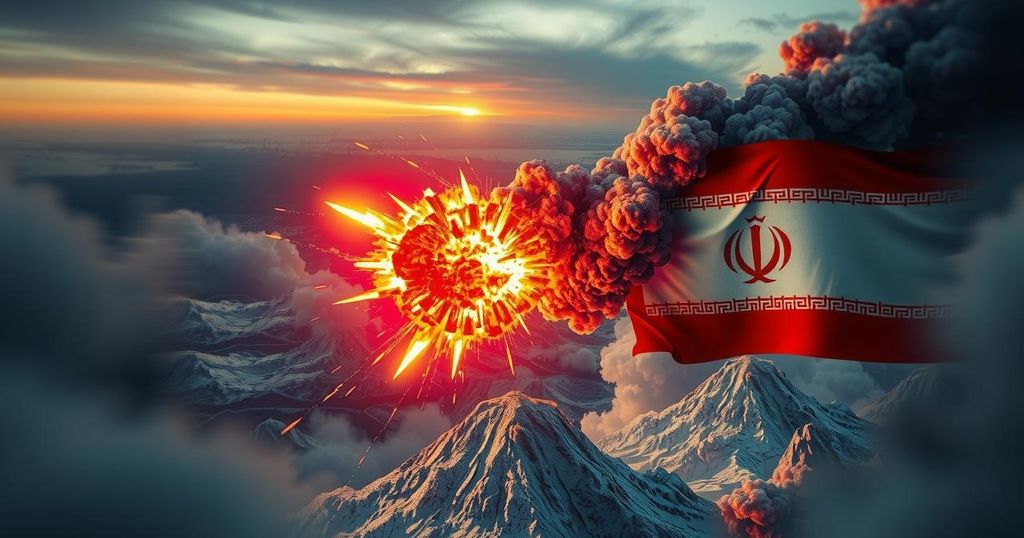Israel Must Confront Iran to Weaken the Houthi Threat in Yemen

Israel is facing increased missile and drone attacks from Iranian-backed Houthis in Yemen, despite retaliatory measures. The Houthis’ capability stems significantly from Iran’s military support, complicating efforts to suppress their aggression. The situation is exacerbated by Yemen’s closed territory status, challenging Israel and U.S. military operations. To effectively address the Houthi threat, direct action against Iran is essential, as the regime continues to bolster the Houthis’ capabilities.
Israel is currently grappling with an intensifying series of missile and drone assaults from the Iranian-backed Houthi rebels in Yemen. Despite Israel’s extensive retaliatory measures, including strategic airstrikes against vital infrastructure such as ports and power stations, the Houthis persist in their aggression largely due to Iran’s ongoing support in terms of armament and training.
The challenge of addressing the Houthi threat is magnified by Yemen’s geographical limitations, which impede intelligence collection and complicate military operations. The Houthi rebels, acting as Iran’s proxy, have significantly disrupted maritime navigation through the Bab al-Mandab Strait, a critical transit route linking significant waterways. This disruption has raised concerns over global shipping operations, prompting some companies to halt services in the region.
In a bid to neutralize the threat, the U.S. initiated Operation Prosperity Guardian; however, the Houthis continued their missile and drone campaigns, including over 200 attacks directed at Israel. These developments necessitate a reappraisal of military tactics as Israel confronts a foe deeply entrenched in its communities and fortified by Iran’s sophisticated military support. The Houthis have managed to maintain their hold on significant territory despite concerted aerial assaults from the Saudi-led coalition.
Iranian backing is the fulcrum of Houthi capabilities, providing them with advanced weaponry and strategic military training. This includes anti-ship missiles, unmanned aerial vehicles (UAVs), and extensive intelligence support from the Islamic Revolutionary Guard Corps (IRGC). Since their integration into Iran’s Axis of Resistance in 2014, the Houthis have transformed from a local insurgent group into a formidable military force, capable of executing complex operations targeting regional and international assets.
The Houthis’ operational advancements, accentuated by Iranian training in naval warfare and their utilization of sophisticated drones and missiles, highlights the necessity of confronting the Iranian regime. Without addressing the source of support from Tehran, it remains improbable to diminish the Houthis’ offensive capabilities effectively. Thus, Israel’s strategy requires not only military engagement with the Houthis but also direct measures against Iran, who fuels their aggression.
In conclusion, the escalating threat posed by the Houthis necessitates a reassessment of the strategies employed by both Israel and its allies. The persistent support from Iran, coupled with Yemen’s challenges, underscores the complexity of the situation. A multi-faceted approach that simultaneously addresses both the Houthis and their benefactor in Tehran appears essential for restoring stability in the region and safeguarding both global trade and national security.
The ongoing conflict between Israel and the Iranian-backed Houthi rebels underscores the broader geopolitical tensions in the Middle East. The Houthis, also known as Ansar Allah, have emerged as a significant proxy for Iran in Yemen, leveraging advanced military capabilities obtained from Tehran to disrupt trade routes and threaten regional stability. The strategic Bab al-Mandab Strait serves as a critical chokepoint, and Houthis’ attacks have far-reaching implications for maritime security and international trade. The complexities of the Yemeni terrain and the deep cultural integration of the Houthis compound the challenges faced by Israel and U.S. forces.
In summary, to effectively counter the Houthi threat, Israel must address the root cause of their capabilities by challenging the Iranian regime that backs them. The historical and ongoing support from Iran is pivotal to the Houthis’ resilience, and without confronting this nexus, efforts to neutralize the Houthis’ military operations will likely prove futile. A comprehensive strategy must include direct measures against Iran to diminish the threat to regional stability and security.
Original Source: www.jpost.com








